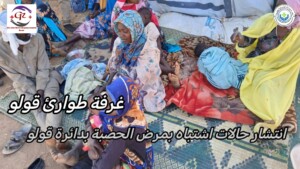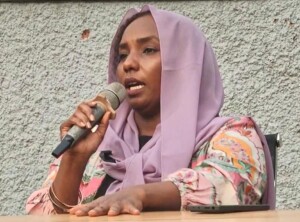Cholera cases swell Khartoum Bahri hospitals
Cholera cases are further proliferating in Khartoum and White Nile states. The Health Ministry recorded 30 new cases while local sources reported about 100 infected patients in areas of Khartoum Bahri.
Cholera cases are further proliferating in Khartoum and White Nile states. The Health Ministry recorded 30 new cases while local sources reported about 100 infected patients in areas of Khartoum Bahri.
Cholera in Khartoum has further expanded to Teibat El Ahamda, known as El Ezba, in Khartoum Bahri. On Monday, the number of dead from cholera rose to 18 people, while there were approximately 100 infected cases in the district's hospitals on Sunday and Monday.
The Ministry of Health in Khartoum state announced t on Monday that 30 new cases have been recorded. There will be “maximum mobilisation” at Teibat El Ahamda area, with cleaning and waste removal campaigns.
Hamdan Ismail, a resident of El Ezba told this station that his sister died of cholera, while his two brothers were infected with the disease.
“El Hadj El Safi and El Amel hospitals refused to receive my brothers, forcing us to transfer them to the academic hospital in Khartoum.” He said that his brothers have recovered from the disease in time. “However, the isolation centre in the academic hospital is overcrowded with patients, where two patients share one bed.”
Health workers in El Ban Jadeed Hospital said that the number of cholera patients there has amounted to more than 30 infected people, allegedly including foreigners. Here, too, hospital rooms are overcrowded with patients and the shortage of beds forces people to share beds.
Declaration of epidemic
Doctors in the Sudanese capital reported 120 new cholera cases over the weekend. In a press conference in Khartoum on Sunday, Dr El Fateh Ali El Hassan said that the Tamayoz Hospital and departments of the Khartoum Teaching Hospital received 48 new cases on Friday and Saturday. Hospitals in Omdurman admitted 20 cases.
Reports of some hospitals in Khartoum refusing to admit cholera patients surfaced during the past week. The Sudanese Communist Party urged the Sudanese government to take its responsibility and declare “a cholera epidemic” in order to receive aid from abroad.
Federal Health Minister Bahar Idris Abugarda told parliament on Thursday that between August 2016 and May 2017 the Ministry recorded 14,659 people infected with “watery diarrhoea”. 292 patients died of watery diarrhoea, the term the government has used for cholera since the first cases were registered in Blue Nile state in September.
Spreading to eastern Sudan, and later to the Northern State and central Sudan’s El Gezira, the disease reached White Nile state in April, where a rapid spread of cholera is reported. Hospitals in North Kordofan started to receive cholera patients too.
White Nile's cases
Abdelrahman El Siddig, the head of civil society organisations in White Nile said that five new cases of cholera were received by health centres in Ulad Makin. These people have been transferred to El Gezira Aba and Asalaya.
The isolation centre in Asalaya has been reopened to accommodate and receive new cases of cholera, a week after its closure, El Siddig said.
The hospital in El Duweim, White Nile, recorded a new cholera case on Monday. The number of hospitalised cases at El Duweim's isolation centre has run up to seven people.
'Medical staff and volunteers of the Sudanese Red Crescent Society in the local hospital are working hard.' – Activist
A local activist reported to Radio Dabanga there is a decrease in the incidences of cholera in El Duweim after witnessing an increase in the past few days.
“The medical staff in El Duweim hospital are working so hard, in addition to the volunteers from Shari El Hawadith Initiative and the Sudanese Red Crescent Society, whom provide treatment services to the patients.”
Journalist El Tahir El Doma told Radio Dabanga that the El Gezira Aba Hospital received one case from El Dibeibat. “The clinic in El Maraabi received seven cases. Most of them come from the nearby villages.” He added that the situation in Kosti “seems to be contained”.
Health Ministry: No cover-up
The Minister of Health, Bahr Idris Abugarda, said that White Nile state has been one of the states stricken the most with the disease.
Abugarda denied that the federal Ministry of Health was covering up the emergence of watery diarrhoea. Abugarda responded to a question posed by independent MP Ahmad Sabah El Kheir about cholera in parliament yesterday. He replied that the doctors' response was quick and has contained the disease from the start with support teams.
He said that there has been “a wide mobilisation of all people in mosques and districts, along with the armed forces, for awareness and guidance” in combating the spread of the disease. The measures have shown positive results therein, according to the Health Minister.











 and then
and then